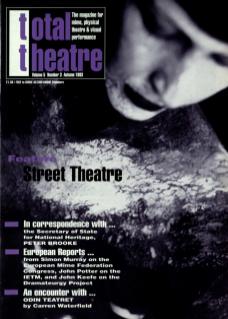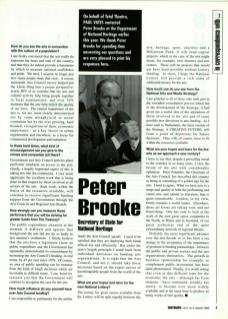How do you see the arts in connection with the culture of a population?
I am firmly convinced that the arts really do represent the heart and soul of the country, and that they do indeed provide a barometer by which to measure national confidence and pride. We tend, I suspect, to forget just how many people share that view. A recent, mammoth Arts Council survey helped put the whole thing into a proper perspective: nearly 80% of us consider that the arts and cultural activity help bring people together in local communities, and over 70% maintain that the arts help enrich the quality of our lives. The central importance of the arts is, for me, most clearly demonstrated not by some metaphysical or moral contention but by the ever growing, hard headed, recognition of their economic importance – as a key factor in urban regeneration and elsewhere, as a focus for commercial development and enterprise.
In these hard times, what kind of encouragement can you give to the mimes and companies out there?
Government and Arts Council policies place particular emphasis on access to the arts: clearly, a hugely important aspect of this is taking arts into the community. I very much appreciate the excellent work that is being done in that respect by those involved in all sectors of the arts. Such work, within the limits of the resources available, will continue to receive significant funding support from the Government through the Arts Councils and Regional Arts Boards.
How strongly can you reassure these performers that you will be striving for greater funds from The Treasury?
The public expenditure situation at the moment is difficult and against that background the arts did not do so badly in last autumn's settlement. I firmly believe that the arts have a legitimate claim on public expenditure and the Government has repeatedly demonstrated its commitment by increasing the Arts Council's funding, in real terms, by 45 percent since 1979. Of course, no area of public spending can be immune from the kind of tough decisions which are inevitable in difficult times. I can, however, reassure you that the Government will continue to recognise the case for the arts.
How much influence do you yourself have over Arts Council funding?
I am responsible to parliament for the public funds the Arts Council spends. I need to be satisfied that they are deploying their funds effectively and efficiently. But under the arm's length principle I stand back from individual decisions on funding arts organisations. It is right that the Arts Council, and not I, should take those decisions based on the expert advice of knowledgeable people from the world of the arts.
What are your hopes and aims for the new National Lottery?
The money for good causes available from the Lottery will be split equally between the arts, heritage, sport, charities and a Millennium Fund. It will fund capital projects, which in the case of the arts might mean, for example, new theatres and arts centres. These will be projects that would not have been possible without Lottery funding. In short, I hope the National Lottery will provide a rich seam of additional money for the arts.
How much use do you see from the National Arts and Media Strategy?
I am grateful to all of those who took part in the extended consultation process which led to the development of the Strategy; it had given me a useful idea of the aspirations of those involved in the arts and of some possible new directions in arts funding. As I have said in Parliament, the final version of the Strategy, A Creative Future, will form a point of departure for future decisions. They will, of course, have to fit within the resources available.
What are your hopes and fears for the live arts as we approach a new century?
I have to say that, despite a prevailing mood to the contrary in so many areas, I view the future of the arts with considerable optimism. Peter Palumbo, the Chairman of the Arts Council, has described this country as being in something of a golden age for the arts. I tend to agree. What we have now is a range and quality in both the performing and visual arts, and indeed in literature, that is quite remarkable. London, in my view, firmly remains a world leader. Elsewhere, these artforms are taking root, and are flourishing. One has only to look at the work of the now great opera companies in the North, in Wales and in Scotland, of our great orchestras, and of the quite extraordinary network of regional theatre.
Probably the most significant advance over the last decade or so has been a sea change in the acceptance of the importance of productive funding partnerships between the public and private sectors and the arts organisations themselves. The growth in business sponsorship for example, to complement public investment, has been quite phenomenal. Finally, it is worth noting that even at this difficult time for the economy, the arts – although far from immune – have continued, steadily but surely, to become ever more widely available and at the same time to produce so many works of rare quality.

